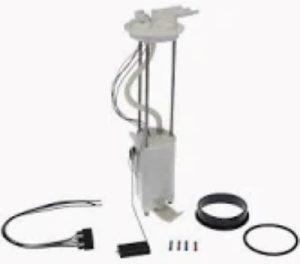Your fuel system is one of the most important components of your vehicle and to maintain it as such, its even more important that you keep the fuel pump corrosion free. Left unchecked, corrosion may eventually decrease fuel economy, affect machine performance and ultimately cause pump failure. Thankfully, there are many successful methods to reduce the presence of corrosion.
Some cheaper ways to prevent fuel pump corrosion is by using a good quality fuel with additives that provide protection against moisture and corrosion. Ethanol-containing gasolines—about 10% of the U.S. gasoline stream—can pull in moisture and promote rust in the fuel system. A fuel stabilizer or ethanol free gasoline could be enough to make water not accumulate in the tank leading to corrosion of the pump.
Top Up The Fuel Tank: Another essential tip for inopportune conditions, if it's cold or damp out there - try to keep the fuel tank at least half-full, thus avoiding condensation from forming there. Rust is an enemy of the tank, and one of its favorite environments for rust to grow is … rust. Yes, moisture in the tank can turn into rust (DUH) and that crap plugs up the fuel pump eventually too! It is as well-formed a barrier to moisture condensation as any, though it has the added bonus of extending the fuel pump's life by 15% to 20%.
Check and Replace Fuel Filters Often: The fuel filters are an important piece because it captures any debris before it reaches the fuel pump. If left in the fuel system for some time, a clogged filter can ultimately lead to fuel pump wear by making it work overtime and increasing potential corrosion. Changing the filter at 15,000 – 30,000 miles can yield improved fuel flow and prevent harmful particles from entering your system designed to promote corrosion.

Look for Water in the Fuel System: In climatically turbulent regions, water is often found in fuel systems. Water in your fuel — if an engine splutters to a halt, struggles to start or lurches during operation, you may have water in the fuel. By using a fuel treatment that separates and removes water from the tank, your pump will not rust or corrode.
Check the Fuel Cap Seal- A properly sealed fuel cap is crucial in keeping out outside moisture and pollutants from entering the fuel tank. Check the fuel cap regularly for any signs of cracks or damaged seals and replace it as needed. For example, a new fuel cap can cost less than $20 and help protect your vehicle from damage that would require repairs on the order of $500 (fuel pump).
Corrosion-Resistant Fuel Pumps: New fuel pumps have corrosion-resistant surfaces, like stainless steel or treated aluminum that make them last longer. By incorporating these materials in a pump, up to 50% of the life are prolongated too. When asked how long a corrosion-resistant pump would endure, Freeborn says it varies by driving conditions but likely should fall in the 80,000- to 100,000-mile range.
25% of all fuel pump failures in vehicles older than 5 years were associated with corrosion, making it a preventive action to keep your car going.
Henry Royce, co-founder of Rolls-Royce once said this: “Take the best that exists and make it better. By doing so, you can help keep your fuel pump in tip-top shape and lessen the chances of it failing because of corrosion.
If you're searching for high-quality fuel pumps in stock which will last longer and not corrode, then take a look at the Fuel Pump website. Built to last through tough conditions,these pumps offer reliability that helps give you peace of mind.